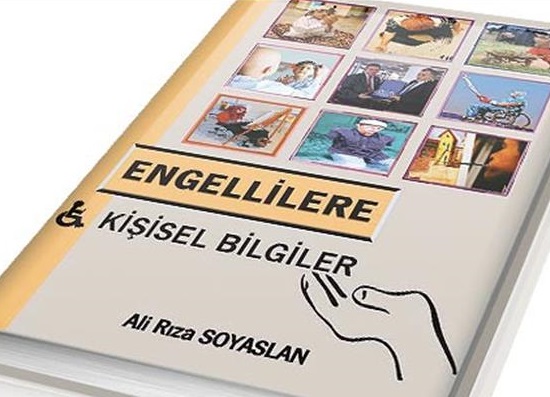“A disability is a cause. Be the star of this cause so that all of humankind can see you as an example,” Soyaslan said, referring to the lack of knowledge among the general public in Turkey about living with physical disabilities.
Published this month, the book is a product of two years of research. It seeks to create greater awareness of the issues surrounding living with a disability while being interesting enough that people both with and without physical disabilities will read it, Soyaslan told Sunday's Zaman.
Therefore, one may find that the style of the book is rather different. It hopes to grab and hold the reader's attention, not bore with endless facts. It is a gift from the author to everyone who wants to be more informed, Soyaslan said, as well as an act of service and a gift to the disabled. It can be downloaded for free on various sites as an e-book.
At first glance, “A Personal Guide for the Disabled” looks like any other self-help book that tells you step by step what to do in order to be happy. However, the innovative style of this book offers a surprise. There is a blend of formats that includes using sayings of the Prophet Muhammad [PBUH] and verses of the Quran, personal stories and quotes from public figures and films to inspire the reader. Beyond offering tips and techniques, it hopes to make the reader, and especially a disabled person, understand that what might be seen as a disadvantage may actually be his or her best feature.
Soyaslan believes that by providing Islamic references to disabilities and looking at the subject from an Islamic perspective, having a disability may be better understood.
“Islam gives a person with a disability great honor,” he told Sunday's Zaman. As a result, the reader might find that the book also provides spiritual guidance. There are the personal stories of several people who found hope and overcame their problems through their faith in God. They realized that having a disability is not a disease, but rather it is a blessing and their disabilities have made them more grateful.
“A Personal Guide for the Disabled,” which is divided into 12 parts, hopes to show the reader that a disability is simply a different way of functioning. The first three chapters offer an understanding of why the disabled person may have been “granted” their disability, using Islamic references and stories based on personal accounts. The next section includes selected segments and quotes from the Quran and explanatory passages to help the reader understand the citations and what Islam says about being disabled. Soyaslan uses these Islamic reference points to illustrate that the disabled person is not a burden to society, as the disabled are capable of taking responsibility and being active members of the society. The next several chapters are a combination of inspirational tales from artists, scientists, politicians, athletes and public figures who, despite disabilities, developed successful careers, and quotes from selected films and other sources.
“Hey. Don't ever let somebody tell you… You can't do something. Not even me. All right? … You got a dream… You gotta protect it. People can't do somethin' themselves, they wanna tell you you can't do it. If you want somethin', go get it. Period.”
This quote from the movie “The Pursuit of Happyness,” like many of the quotes in the book, perfectly sums up Soyaslan's message that one should not give up his or her life in response to a limitation.
The book ends with a list of widely respected and accomplished hafizes, a term used for those who memorize the entire Quran, who also have disabilities. Their physical limitations were not an obstacle for them.
Greater awareness of living with a disability
As the only one in the family who did not have a disability, Ali Rıza Soyaslan grew up in an environment that was rather different from that of his friends. Because his parents and two brothers have disabilities, Soyaslan witnessed from an early age the problematic issues of having physical limitations in a country like Turkey.
Speaking with Sunday's Zaman, Soyaslan said his upbringing inspired him to work in this field and that it is a mission for him to create greater awareness of the disabled.
“The visibility of disabled people in our society compared to Europe is rather low. They are not a part of society because the common perception is that there is no room for disabled persons in our society. Unfortunately, this is the case in Turkey. Instead of emphasizing how a person with disability problems can be actively involved in the work sector, the state gives them social services like a monthly payment without contributing to society, making them consumers instead of producers. If they also were a part of the producing team, the mentality of them being a burden would be gone. Disabled persons are not a social burden in Europe because they contribute to their society.”
Overall, the book leaves the reader with a greater understanding of what it means to be disabled and an appreciation of life through its inspiring passages and examples of those who have faced this challenge and succeeded in living a happy, successful life.
The format and style of the book keep it interesting and light; the reader is not bored by endless tales of the disabled being the underdog, and the variation as it goes from personal stories, references from the Quran, quotes and short stories is refreshing. It is only 180 pages, making it a fast read, but one that leaves a big impact.
Source: Today’s Zaman

